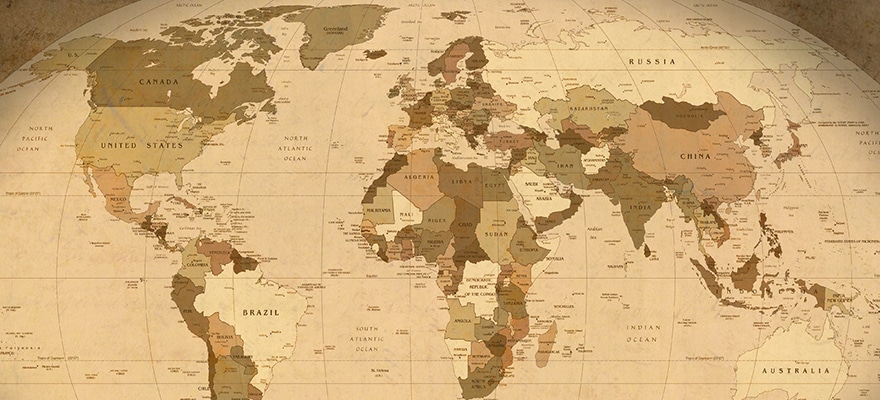"I Will Look to the Hills"
The inaction of fiscal policy makers has thwarted the best intentions of central bankers. This was the warning of a guest speaker, Christopher A. Sims, a Nobel laureate in economic science from Princeton, who addressed US central bankers at a recent economic conference at Grand Teton National Park.
The central issue is that of jump-starting slow economic growth. Despite the response of the US central bank, growth remains slow, inflation remains weak and millions of middle-aged Americans are no longer working.
It seems to me that a reallocation of resources in the US economy is indeed in order. An ineffectual US Congress and a central bank which more and more appears to be irrelevant to the economic trials and tribulations of the person on Main Street, are indeed symptomatic of the US economic growth malaise.
National and Global Growth
It is obvious to all but the willfully blind that e-commerce is growing by leaps and bounds both nationally and globally. The global growth of Amazon, Walmart and Uber sufficiently evidence this trend. Amazon and Walmart provide a platform for thousands of third party marketers and millions of products sold via the internet.
This growth is global as well as national. Walmart's buying 5% of JD.com in order to succeed in China is symptomatic of the growth and adaptability of global e-commerce. The mold has been broken by e-commerce; a mold which too often confines national growth to monopoly and global scaling to oligopoly.
During the recent G20 Summit in Beijing, president Yudhoyono of Indonesia asked Jack Ma of Alibaba Holdings Group to advise Indonesia on growing an e-commerce based economy. Interestingly, Jack Ma has just spoken at an international logistics convention about e-commerce and its effect on the economy of China.
Logistics
It is not e-commerce, Ma said, which alone impelled the massive changes in the Chinese economy. It was logistics.
In the last 10 years, logistics have resulted in growth and extraordinary efficiency in the delivery of goods directly, same day or overnight from manufacturer to consumer. Logistics, Ma said, represent the opportunity to use interior drones to select, assemble and move products and to eliminate warehouses, to perfect the direct distribution from manufacturer to consumer, eliminating costs and inefficiency in the process.
Culture and Innovation
Every culture affects e-commerce in a different way. Grab (taxi) in Singapore is more appropriate than Uber because it accepts cash and adheres more closely to the cultural idiosyncrasies and sensitivities of the local culture.
In China, WeChat succeeded where Amazon failed because the former provides a range of facilities and capabilities which Amazon does not. Didi Chuxing provides nuanced and culturally-relevant functions and features in China which Uber does not.
Bloomberg reports that Didi Chuxing will buy Uber China and create a new entity worth $35 billion—the combined valuation of Uber China and Didi, which alone is worth $28 billion. Didi will retain the Uber brand, and Uber CEO Travis Kalanick and Didi founder Cheng Wei will join each other’s companies’ boards.
It is not Amazon and Uber alone which have had difficulties in scaling globally. Chinese e-commerce giant Alibaba Group Holding Ltd. has held partnerships talks with a several start-ups in India, including Snapdeal and Shopclues.
Alibaba Group Holding Ltd. isn’t living up to its promise to root out counterfeit goods on its online marketplaces, a coalition of retail trade groups say.
In a letter to the Chinese e-commerce company, nearly a dozen groups identified several steps Alibaba could take - but hasn’t - to permanently reduce the number of fakes for sale, the WSJ’s Kathy Chu writes. Others are less charitable, with one U.S. apparel trade group saying it had “seen no evidence of improvement” and calling Alibaba’s Taobao marketplace “flooded with counterfeits”.
Alibaba has had repeated run-ins with the fashion industry over perceived leniency toward fake goods. But the stakes are higher now, with the U.S. Trade Representative drawing up a list of foreign sites known for counterfeit goods and the Chinese government examining the issue as well.
Having failed in China, Amazon's and Uber's eyes will inevitably turn to India which is a very different market than that of China.
India’s e-commerce companies are a decade away from becoming 'mega-businesses' because the country’s population is still too poor, Google India’s chief said.
E-commerce and Democracy
Unlike the continuum of national monopoly and global oligopoly which continues to create synergies, eliminate jobs and concentrate wealth, e-commerce platforms provide the opportunity for MSMEs to market and sell globally. This global deployment represents a democratization of wealth propagation.
E-Commerce and Global Economic Growth
E-commerce provides a compelling opportunity for MSMEs to scale globally. The president of Indonesia was wise enough to recognize this opportunity in enlisting the help of Jack Ma. Unless e-commerce-based apps and functions and features are more country-appropriate and democratic, the purveyors of these platforms will soon find out that unlike Paul Friedman's insistence that the world is flat, it is in fact very nuanced and very culturally-sensitive.





















